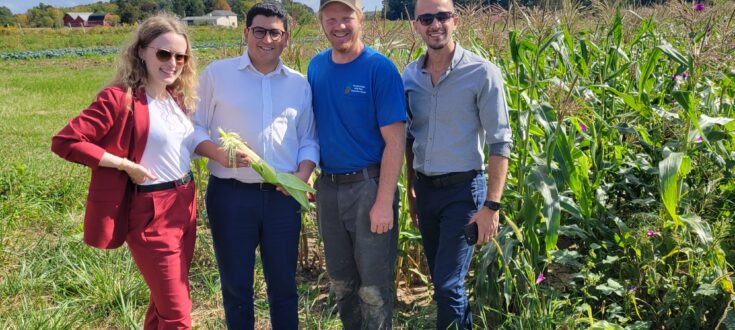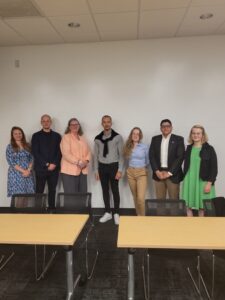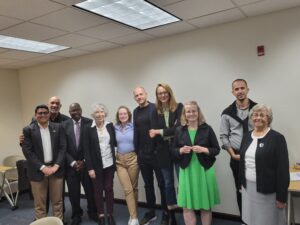Fall into Current Affairs! Young European Leaders Visit Part 1!

September is a time of learning and change. This is the time that summer fades into the cool weather of fall, kids go back to school, and we begin looking forward to the holidays.
September a time to fall into current affairs!
During the week of September 27th, the World Affairs Council welcomed an eight-member delegation of young European leaders from Armenia, Belgium, Bulgaria, Croatia, Finland, Greenland, Italy, and the Republic of Türkiye. They had come to Cincinnati and Northern Kentucky for exposure to current U.S. social, political, and economic issues—and the associated policy formulation.
These are all issues that we hear on the media. Most of them seem like issues which don’t affect us much at home. We think of them as something that happens in Washington, DC—topics that are hotly debated on the news but have little to do with the humdrum of our everyday lives.
That’s not true. These issues are important here, too. Social, political, and economic issues affect everyone in the Greater Cincinnati area every day at every level.
During their time here, they met with local community resources: the Immigrant and Refugee Law Center, the Metropolitan Area Religious Coalition of Cincinnati (MARCC), the European-American Chamber of Commerce, the Cincinnati Enquirer, Lobenstein Farm, St. Elizabeth’s Physician Urgent Care, and East Central High School.
Here are a few highlights from their program!
Immigrant and Refugee Law Center
Immigration and refugees are a hot button topic. Every election season, the American media is flooded with images of illegal immigrants flooding the Southern border. But what does this really have to do with Cincinnati and Northern Kentucky if this is an issue that is hundreds of miles away?
Well, it’s not an issue that is hundreds of miles away. Every year Ohio welcomes 3,572 refugees every year through the United States Refugee Admissions Program (USRAP). Kentucky welcomes even more, at a whopping 8,061.
While the U.S. accepts far less refugees than European countries do every year, this is an issue that every country in the room struggles with. It is important for the delegates to gain an understanding about this issue.

World Affairs Council President and CEO, Michelle Glandorf (far left), and Immigration and Refugee Law Center Attorney, Alexandria Lubans-Otto, Esq. (center left) meet with international delegates.
Alexandria Lubans-Otto, Esq., the Managing Attorney, at the Immigrant and Refugee Law Center spoke to the delegates about the process immigrants and refugees face when they arrive in the United States. As the daughter of immigrants, herself, she is very passionate about making sure that immigrants and refugees have access to legal representation during interviews for citizenship and court proceedings, along with the aid of interpretation for questions so that they can accurately and fully answer any questions asked of them.
The delegates asked many questions about the Immigrant and Refugee Law Center’s work. The one question that stuck out was: What would she change?
Lubans-Otto spoke frankly on this issue. First, the law must change. While policies immigrant and refugee policies fluctuate with every administration, the law on these specific issues was formulated on September 24th, 1996, and have not been changed in the last 27 years. Currently, immigrants cannot get jobs for six months after immigrating—this is a policy adopted by the Clinton administration in 1994. Lubans-Otto says that immigrants should receive their authorization to work 180 days after arrival, the same time frame as refugees. This is important because the United States is facing a labor shortage. American companies are desperate to fill positions. Not only does this fill positions that desperately need it, allowing immigrants into the workforce earlier diversifies the workforce, expands the economy, and prevents tax payers from paying hundreds of thousands of dollars on deportation charters. This is a win-win all the way around.
Several delegates were interested in learning how to bring the services offered by the Immigrant and Refugee Law Center to their home countries and the process of implementing them.
Metropolitian Area Religious Coalition of Cincinnati (MARCC)
Interfaith dialogue is important to include in the conversation when talking about current social, political, and economic issues. The United States Institute of Peace defines interfaith dialogue as “people of different religious faiths coming together to have a conversation”. MARCC is no different. MARCC is a coalition of 14 Jewish, Roman Catholic, Muslim, Protestant, Unitarian-Universalist judicatories to collaborate on a few local social concerns to improve life for the people of Metropolitan Cincinnati.
Our delegates were interested in learning more about how an interfaith organization can partner with local government to protect vulnerable communities. They were focused on learning about the social concerns priorities and collaborations with local policy makers.
The MARCC I.D. is an incredible example of how MARCC has collaborated with the City of Cincinnati to create a policy to protect our vulnerable communities. The MARCC I.D., is a primary identification card recognized by the Cincinnati Police, Cincinnati Police Department, and medical facilities such as hospitals. MARCC worked with the Mayor of Cincinnati and the City Council Members to create this identification card and ensure its recognition.
Covington, Kentucky also recognizes the MARCC I.D. card. Dayton and Cleveland, OH are on track to follow suit and create a similar identification card that will fit their own model.
From the media, the delegates are very aware of the polarized political landscape in the United States. They were curious about whether this affected the MARCC and the decisions they made.
Representatives from MARCC explained that they set aside politics because it is not conducive to the conversation. Instead, they look for places where they can come together to find consensus. Each of the four representatives of MARCC spoke to this.
Mr. Tyrone Jackson, the Assistant Secretary, and representative of the Cincinnati Islamic Center, said that MARCC is driven by diversity. It is important to
“bring your perspective, strategy, and skillset to make the world a better place.”
Rabbi Margaret Meyer, Former President (2015-2017), said,
“It is just important to know and work with each other. [We] can’t take it for granted. Going alone, no one wins.”
Reverend Thomas Barnes, President, and representative for Disciples of Christ, said,
“We can come together on common objective and move together for a positive goal.”
He also mentioned that MARCC reflects the diversity within himself and being a part of MARCC is his “best accomplishments.”
Margaret Fox, Executive Director, explained that equity and fairness were a just response. It is important for us to
“become part of the solution and appreciate that even more.”
Reverend Barnes, Tyrone Jackson, Margaret Fox (left, and Rabbi Meyer (far right) meet with international delegates.
Our delegate from Bulgaria explained that in Europe, faith is an obstacle in coming together because most people are atheists. Another delegate explained that in Iceland, most churches are closed and locked, unavailable to people, unless it is a special occasion.
MARCC representatives said that post-Covid, people are coming back out in droves in Cincinnati. They are looking for community, connection, and something to believe in. This is something that we can take advantage of and use this desire for community to create social change.
If you’re interested in hearing more about the delegates’ visit, tune back in next week for part 2!



